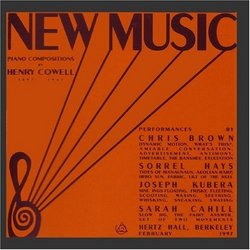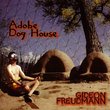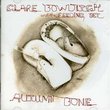| All Artists: Henry Cowell Title: New Music: Piano Compositions By Henry Cowell Members Wishing: 2 Total Copies: 0 Label: New Albion Records Release Date: 11/18/2009 Genres: Dance & Electronic, Classical Styles: Ballets & Dances, Dances, Forms & Genres, Short Forms, Suites, Historical Periods, Classical (c.1770-1830), Instruments, Keyboard Number of Discs: 1 SwapaCD Credits: 1 UPC: 022551010321 |
Search - Henry Cowell :: New Music: Piano Compositions By Henry Cowell
 | Henry Cowell New Music: Piano Compositions By Henry Cowell Genres: Dance & Electronic, Classical
New Music: Piano Compositions By Henry Cowell by Henry Cowell |
Larger Image |
CD DetailsSynopsis
Album Description New Music: Piano Compositions By Henry Cowell by Henry Cowell Similar CDs
|
CD ReviewsA well-filled disc of Cowell's piano music, beset by sonic a Discophage | France | 09/30/2007 (3 out of 5 stars) "This CD originated in a three-concert festival given as a tribute to Henry Cowell in 1997 and joins four different pianists giving a fairly complete overview of the composer's piano music. Most of the most famous pieces are represented (among the twenty recorded by Cowell himself in 1962 on an invaluable Folkways/Smithsonian disc Henry Cowell plays his own Piano Music, Snows of Fuji-Yama, Tiger, Sinister Resonance, Anger Dance and The Voice of Lir are missing), and some rarities as well, like the complete series of "Nine Ings" (short etudes with titles in gerund form - Floating, Frisking etc.) given by Joseph Kubera, or the unpublished pieces played by Sarah Cahill (the disc's liner notes from 1997 announced that a publication was underway at Schirmer's. Ten years later, it is apparently still "underway"). It's nice also to have Dynamic Motion followed by its five Encores - an apparently obvious choice, but one that is rarely exerciced, the set's last piece, "Time Table", being usually omitted and the others shuffled around. So, with 70+ minutes of music, all this might have made a fine modern complement to Cowell's indispensable but sonically deficient testimony, hadn't the disc been flawed by a number of problems.
First, the recording pickup is annoyingly distant and the piano(s) lacks clarity, which is particularly detrimental with Cowell, as much of his playing on resonance gets lost. The mikes have also picked up some interfering mechanical noises - pedals, pages turning or pianist moving - and although Cowell was one of the greatest innovators in piano sounds, these are definitely not the ones he had in mind. The interpretations are also variable. In "Dynamic Motion" Chris Brown is precise and powerful, though not as much as the composer himself. Likewise, his "Antinomy" (4th Encore) and "Time Table" are powerful and evocative (and the resonance from silently depressed chords registers well in the latter). On the other hand, in "Advertisement" (3rd Encore) he is somewhat pedestrian and lacking frenzy (compared to Shields on Piano Music In America 1900-1945 or de Mare on Wizards & Wildmen); "What's This" (1st Encore) conveys an impression of plodding and "Amiable Conversation" (2nd Encore) is less dynamic than either the composer's or Sorrel Hays (see hereafter), its heavy-footedness making it sound almost like a Bartok rustic dance - an interesting alternative approach, but in the same vein Anthony de Mare has more snap. Taken at a slow tempo, "Exultation" has very little feeling of exultation and because of the distant sonics the cluster resonances don't come out well. His "Banshee" - arguably Cowell's finest composition, played entirely on the piano strings, and a terrifying evocation of the "fairy woman who comes at the time of death to take the soul back into the Inner World" - is messed up by annoying extraneous noises, and Brown anyway is not up to the pieces evocative demands: subdued, kept at low dynamic levels, his Banshee may vaguely worry, but never frightens as she does when harped by Cowell. The timings given for his pieces on the back cover have been misatributed. In 1977 Sorrel Hays made the pionnering modern recording of Cowell's piano music for Finnadar (it has been reissued on CD by TownHall: Sorrel Doris Hays Plays the Piano Music of Henry Cowell). The five pieces she plays for New Albion were already on Finnadar, and in the intervening years she has radically changed her approach of some of them. In "Aeolian Harp" her tempo has now ground to a near standstill, but it gives it great atmosphere. She has lost much of her former exuberance in the Allegro con brio section of "Hero Sun" and now sounds tame. She's more spacious too in "Fabric", which lends it a nice, pensive quality, but the recording doesn't afford the same crystal clarity to the polyrhythms as before. The tempo of "Tides of Manaunaun" hasn't changed since 1977 - now as then it is significantly slower than the composer's own, making it sound like some Russian Orthodox religious procession. Despite the muffled sound, she develops impressive power. On the other hand her "Lilt of the Reel" has more exuberance than in 1977, though the overall timing is longer (she takes more time in the more meditative moments); she has the required tempo flexibility ("Allegro con rubato"), the color and a great way at whipping some of those clusters. Overall her approach offers a welcome alternative to her previous one and to the composer's own. As nice as it is to have the only complete recording of the "Nine Ings" (the only previous one was a selection of the six first ones by Hays), this advantage is offset both by the annoyingly distant recording (Hays' is much clearer) and by Joseph Kubera's reading, which is always inferior to Hays. In the dynamic pieces (Fleeting, Scooting, Seething) he doesn't have her snap and muscularity and in the more relaxed and dreamy ones (Floating, Wafting) his ponderous tempo doesn't let the music flow has nicely as hers. The Nine Ings aren't either Cowell's most memorable and innovative music, something like Rossinian "Petits riens", the most interesting of which explore various polyrhythmic figures or out-of-sync meters. Cahill contributes a good reading of "Deep Color", spacious in tempo, rising from dreamy nostalgia to grandiose bass tone clusters, and her "Fairy Answer" is quite atmospheric, with a fine sense of Cowellian rubato (these two pieces also exist in excellent readings by Joel Sachs: Henry Cowell: Instrumental, Chamber and Vocal Music, Vol. 1). Her "Slow Jig" is powerful but not as exuberant as the composer's own (who calls it just "Jig" as well). At the bottom of the line, this can be recommended only to die-hard Cowellites, to whom it'll provide, in no particular order of desirability, the complete "Dynamic Motion" and its Encores and "Nine Ings", albeit in skewed interpretations, Cahill's unpublished scores and Hays alternative view. The others should be directed first and foremost to Cowell's own recording, to Hays' Finnadar-Townhall or the the excellent selection by Chris Burn on Acta (available in the UK) - all gallantly refered to in the disc's notes. " |

 Track Listings (26) - Disc #1
Track Listings (26) - Disc #1
